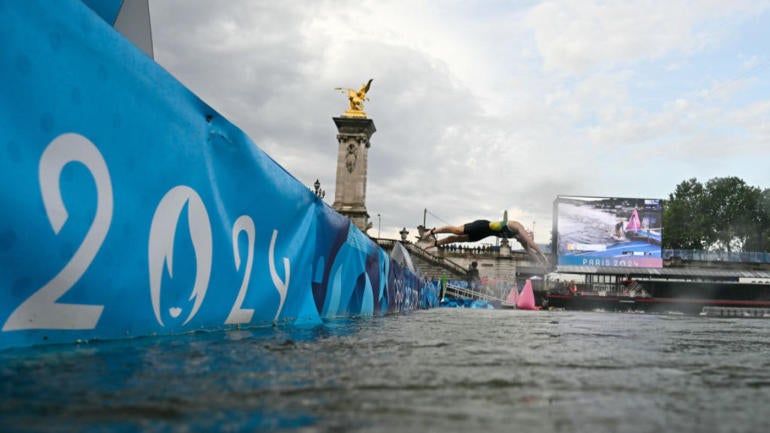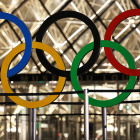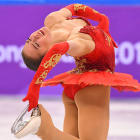
The 2024 Paris Olympics have been filled with thrilling moments, but the Summer Games haven't been without controversy.
Leading into the Paris Olympics, the safety of the Seine River was something Olympic officials had to monitor. On Tuesday, Olympic triathlon swimmers were supposed to compete in the 10K event, but it was cancelled due to "water quality concerns."
Just two days prior, Belgium's Olympic committee announced it was withdrawing from the mixed relay triathlon. This comes after one of the team's competitors, Claire Michel, completed in the women's triathlon last Wednesday and became ill. Olympic organizers didn't provide a statement on Michel's illness. However, organizers had previously stated water quality tests were performed on the day of the race, and those tests showed "very good" bacteria levels.
The Belgian Olympic committee said in a statement it hopes "that lessons will be learned for future triathlon competitions at the Olympic Games. We are thinking here of the guarantee of training days, competition days and the competition format, which must be clarified in advance and ensure that there is no uncertainty for the athletes, entourage and supporters."
Prior to the Paris Olympics getting underway, France spent an estimated 1.4 billion euros to clean the polluted river. Olympic organizers have tested the Seine for bacteria contamination prior to each of the triathlon races. There are scheduled to be marathon men's and women's swimming events Thursday and Friday before the Summer Games conclude.
May -- Paris officials integrate underground water storage basin
In an effort to collect rainwater and stop waste from entering the Seine, Paris officials created a giant underground water storage basin located next to the Austerlitz train station in the city. The basin is able to hold the amount of 20 Olympic pools of water that were expected to be treated. In addition, daily water quality tests were performed and showed there were unsafe levels of E. coli bacteria in June 2024.
July 2 -- Opening ceremony rehearsal cancelled due to fecal bacteria
An opening ceremony rehearsal slated to be held in the Seine rehearsal was cancelled due to dangerous level of fecal bacteria found by Paris City Hall. After months of rainy weather, the Seine was flowing at four to five times higher than its normal level. Olympic organizers were hopeful the level would subside over the next three weeks leading into the Paris Olympics.
July 13-17 -- French officials swim in the Seine
French sports minister Amelie Oudéa-Castéra swam in the Seine in a body suit, traveling a couple of meters near the Alexandre III bridge. Paris mayor Anne Hidalgo, meanwhile, took a dip in the Seine four days later. Hidalgo donned a wetsuit and goggles as she swam in the body of water.
July 26 -- Olympic opening ceremony occurs on the Seine
The opening ceremony for the Paris Olympics occurred with each participating country sailing down the Seine via boats. More rain fell down on the festivities, which was attended by over 300,000 fans. Also on this day, test results showed the Seine's water wasn't safe when Hidalgo swam in it.
July 28 -- Pre-race triathlon swimming cancelled
A day before pre-race triathlon swimming was scheduled to take place, the event was cancelled. According to Olympic organizers, the swimming legs of the triathlon were removed after the water quality was deemed poor following multiple tests. Still, organizers stated they were optimistic that athletes would be able to swim in the Seine once the triathlon event began.
Aug. 4 -- Water tests reviewed
World Triathlon representatives, the International Olympic Committee and Olympic organizers met to review water tests from the Seine. Those results showed the water quality had improved in recent days. The tests, which are taken on a daily basis, measure levels of fecal bacteria, including E. coli.
According to World Triathlon's guidelines, E. coli levels up to 1,000 colony-forming units per 100 milliliters can be categorized as "good" and would allow Olympic events to take place in the Seine. World Triathlon's medical committee has previously stated it consider water quality, sanitary inspection and the weather forecast when they decided whether to hold a race. Those decisions traditionally happen on the day of the event.
Test swims in the Seine were supposed to take place this past Saturday and Sunday prior to the triathlon mixed relay, but were cancelled due to elevated bacteria levels.
Aug. 4 -- Athletes fall ill
Belgium withdraw its team from the mixed relay triathlon after one the team's athletes, Claire Michel, became ill after completing in the women's triathlon last Wednesday. Olympic organizers had previously stated water quality tests were performed on the day of the race, and those tests showed "very good" bacteria levels.
In addition, Switzerland's Adrien Briffod contracted a "gastrointestinal infection," according to a statement from Swiss Triathlon. The organization also revealed "it is not possible to say whether Briffod's infection is related to the water quality of the Seine." Swiss swimmer Simon Westermann, who was supposed to replace Briffod in the event, was also forced to withdraw due to a gastrointestinal infection.
Norwegian triathlete Vetle Bergsvik Thorn also fell will just one day after competing in the men's triathlon. Thorn told Norwegian broadcaster NRK he woke up with a pain in his stomach and began vomiting shortly after. He did feel better later in the day.
![[object Object] Logo](https://sportshub.cbsistatic.com/i/2020/04/22/e9ceb731-8b3f-4c60-98fe-090ab66a2997/screen-shot-2020-04-22-at-11-04-56-am.png)
















